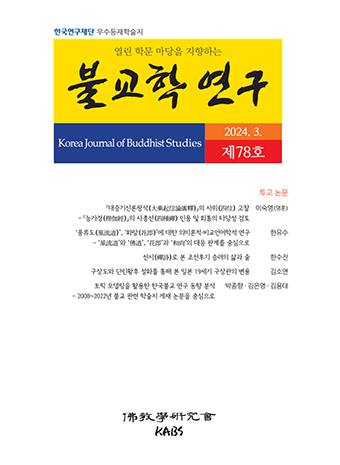Abstract
References
Sorry, not available.
Click the PDF button.
Information
In this paper, I will prove that the three prajña(三智) is a point of "The Teaching of Samādhi of no Dispute in all Dharma"(諸法無諍三昧法門). The three prajña is mārga-prajña(道智), mārga-bīja-prajña(道種智), sarva-bīja-prajña(一切種智). Mārga-prajña(道智) is the enligh- tenment of śūnya(空). Mārga-bīja-prajña(道種智) is the prajña that know the temperament of all living beings. And sarva-bīja-prajña(一切種智) is the prajña that creates the supernatural and relieve all living beings. This three prajña is a foundation of Hui-ssu's thoughts in "The Teaching of Samādhi of no Dispute in all Dharma"(諸法無諍三昧法門).Hui-ssu harmonizes all buddhist teaching by the three prajña. For this purpose, he present Dhyāna Pāramitā(禪波羅蜜) that includes the three prajña. Dhyāna Pāramitā(禪波羅蜜) is divided two kind. One is Dhyāna Pāramitā(禪波羅蜜) that belongs to mārga- bīja-prajña(道種智), the other is Dhyāna Pāramitā(禪波羅蜜) that belongs to sarva-bīja-prajña(一切種智). The latter is also divided two kind. One is sarva-bīja-prajña(一切種智) that present the capacity, the other is sarva-bīja-prajña(一切種智) that is presented in a form of self discipline. And Hui-ssu says Catvāri-anupassanā(四念處) that show the three prajña. Catvāri-anupassanā(四念處) is the method of self discipline, but we can find the meaning of the three prajña in Catvāri- anupassanā(四念處). Thus we know that Hui-ssu harmonizes all buddhist teaching and the method of self discipline by the three prajña. And the three prajña that present by Hui-ssu have an important effect on the formation of Chih-i(智顗)' thoughts.
Click the PDF button.
- Publisher :Korean Association of Buddhist Studies
- Publisher(Ko) :불교학연구회
- Journal Title :Korea Journal of Buddhist Studies
- Journal Title(Ko) :불교학연구
- Volume : 4
- No :0
- Pages :59~87


 Korea Journal of Buddhist Studies
Korea Journal of Buddhist Studies






